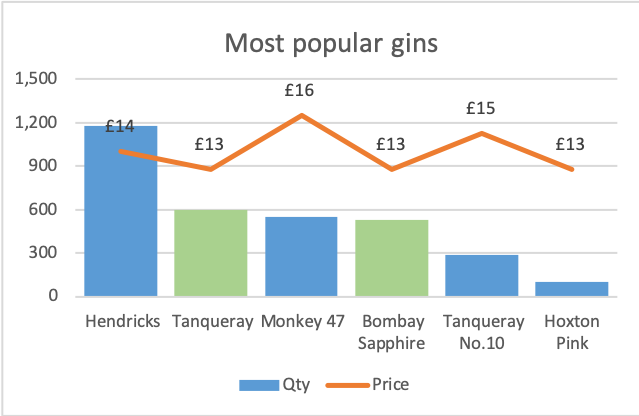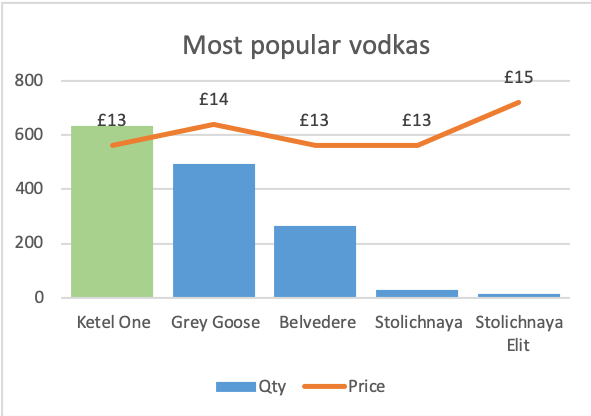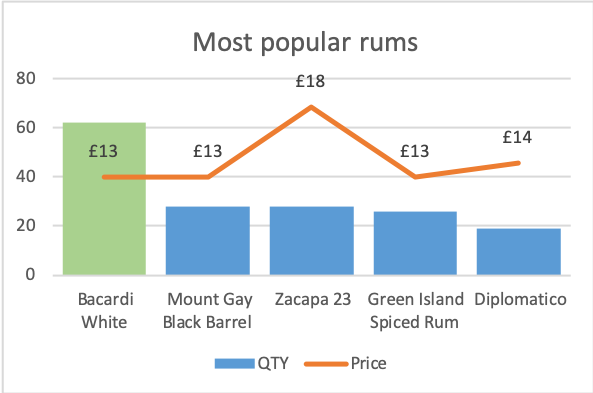This is a solution I proposed for a data based problem while working in a successful five star luxury hotel cocktail bar.
Overview
As a supervisor in one of London’s award winning cocktail bars, where expectations are high and people come to visit from all over the world: I was responsible for overseeing the everyday workflow in the bar: supporting my team, looking after the guests and making sure our standards are being followed consistently.
The selection of spirits available to sell in our bar ranged from 10-50 different products per category with prices from ££-££££ per double shot, which means it is possible for every and any guest to find something that suits their palate with a little help from the bar team, theoretically. Working alongside my team I noticed on daily basis the team would recommend the same few spirits to new and old customers. After gathering the sales data of spirits sold in the last six months, this habit showed in the variety of spirits sales or better – the lack thereof.
The problem
On the graphs you can see sales quantities for three spirit categories over the last 6 months, excluding the use of spirits in cocktails. After the top 5-6 most popular spirits of each category, the sale of rest of the products drops dramatically. The green columns mark the house spirits (which are used when no specification is made) and as you can see in all three of these categories the house spirits are presented in the top 5 as these are the products we mention to customers the most. The price of the spirits chosen stays relatively the same in the top 3, (with an exception of Zacapa 23yo rum which due to its general popularity managed to reach top 3)
The problem I wanted to tackle with this data was to boost teams confidence in promoting the wider of range of products available and increasing profit as the result. Knowing my team I was aware of the inconsistent knowledge base between team members, some knew more some less. I was sure the main reason behind the lack of variety in sales was the unfamiliarity with products available. Being unfamiliar with what you are presenting and selling makes you miss the opportunity of enhancing the guest experience by more engagement.
The goal
- Motivate team members, encourage them to learn new things, learn about themselves and share their knowledge
- Enhance guest experience by more engagement and explaining of products
- Increase profit on spirit sales as a result of engagement with customers
This can only be done by knowing well the products we have on offer, which brings me to….
Proposed solution
I chose as a solution for this problem to give each team member an individual project to work on. This would make them learn deeply one particular subject, for example rum/gin/vodka and share the information learned with the team. Essentially giving their own little masterclass to the team. They would need to explain specific products sold at the bar and what makes them different from each other.
This would encourage them to take ownership for their project and know that their efforts put into this would affect the knowledge of the whole team. The sharing part is crucial, as at that point team members need to put what they have learned in their own words and make it clear for the rest of the team. This is a team effort with great benefits for everyone.
How new knowledge would translate at work
Upselling is not about selling more, it is about opportunity. The opportunity to deliver a great service experience, to truly exceed a customer’s expectations and profits as a result. This would allow the customer to try something new, broaden their knowledge and encourages return business to the bar.


